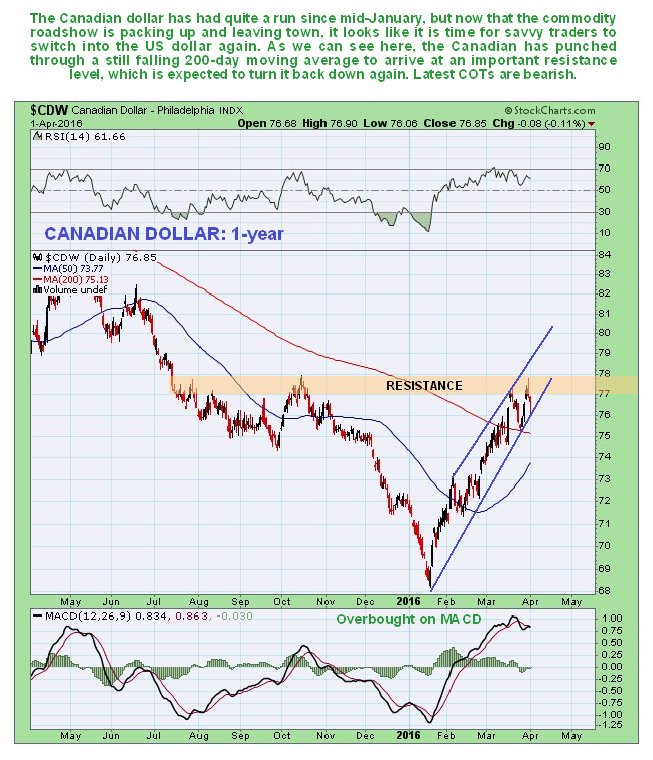Currency
Apr. 5, 2016 7:58 PM ET – The Canadian dollar depreciated today versus the USD. The U.S. dollar gained 0.67 versus the CAD in the last 24 hours. Risk off and traders squaring positions ahead of the release of the Federal Open Market Committee (FOMC) meeting minutes tomorrow at 2:00 pm EDT favoured the USD even as the notes from policy makers will signal further patience from the U.S. central bank.
The release of the Canadian Trade at $1.9 billion deficit was almost three times from last month’s figures. Imports declined 2.6 percent, but in a negative note, exports fell 5.4 percent after a record high $43.7 billion in February. The Canadian dollar did not take the release well, but analysts were expecting a slight setback to the strong start of the year.

Change your Canadian dollars immediately into US dollars, the prime reason being that the Canadian looks set to drop after a big rally from mid-January, while the US dollar looks set to surprise by rallying away from the danger zone of the support around 93 on the dollar index.

EUR/USD Increases –
Alert sent to subscribers on March 31, 2016, 6:40 AM.
Yesterday, the greenback moved sharply lower against the Canadian dollar despite bullish ADP report and declining crude oil prices as sentiment on the U.S. dollar remained weak after Janet Yellen’s speech. As a result, USD/CAD dropped under important support line. How low could the exchange rate go in the coming days?
In our opinion the following forex trading positions are justified – summary:
- EUR/USD: short (stop-loss order at 1.1512; initial downside target at 1.0572)
- GBP/USD: none
- USD/JPY: none
- USD/CAD: none
- USD/CHF: none
- AUD/USD: none

….larger charts & more commentary HERE
Despite the very sharp “March rally,” there is little evidence that the “bullish trend” has been re-established at this point. We can view this more clearly by stepping back and viewing a longer-term (monthly) chart of the market.
 Increasingly, central bankers, economists and market watchers are discussing the pros and cons of what’s called helicopter money, a 47-year old idea that posits a way to kickstart an economy through dropping money on its citizens. Peter Praet of the European Central Bank, for example, said in an interview published last week that “all central banks can do it” if needed; his ECB colleague Jens Weidmann warned that such a move “would rip huge holes in central bank balance sheets.” Helicopter money feels very much like an idea whose time may be coming.
Increasingly, central bankers, economists and market watchers are discussing the pros and cons of what’s called helicopter money, a 47-year old idea that posits a way to kickstart an economy through dropping money on its citizens. Peter Praet of the European Central Bank, for example, said in an interview published last week that “all central banks can do it” if needed; his ECB colleague Jens Weidmann warned that such a move “would rip huge holes in central bank balance sheets.” Helicopter money feels very much like an idea whose time may be coming.















